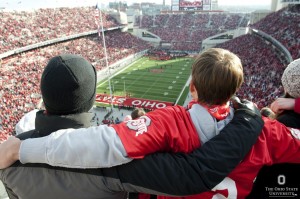 I have more than one family, but I’m not adopted or a child of divorce/remarriage. I have my nuclear family (parents, siblings) and extended family (grandmas, uncle). Then there’s my “church family,” my neighbor who is a “grandmother figure” and the women who are “like a sister” or a “second mom” to me. As an employee and graduate of The Ohio State University, it is not uncommon to be identified as a “Buckeye.”
I have more than one family, but I’m not adopted or a child of divorce/remarriage. I have my nuclear family (parents, siblings) and extended family (grandmas, uncle). Then there’s my “church family,” my neighbor who is a “grandmother figure” and the women who are “like a sister” or a “second mom” to me. As an employee and graduate of The Ohio State University, it is not uncommon to be identified as a “Buckeye.”
Birth, marriage and adoption assign us roles as parents, siblings, children and spouses, but, sometimes, we choose our family. The “Aunt Jane” or “Uncle John” you won’t find on the family tree, the strong “brotherhood” forged in the crucible of military combat, and that unique “bromance” are all special relationships that are deeper than friendship. “Voluntary kin,” are those we consider family, even if there is no blood or legal tie. The label of godparent is one of the oldest instances of being unrelated but playing a familial role.
Some of the strong ties I feel to my chosen family are founded on deep friendships. Psychologist Keith E. Davis identifies eight elements in successful friendships. They are: enjoyment, acceptance, trust, respect, mutual assistance, confiding in each other, understanding, and spontaneity. When I read through this checklist, certain people come to mind whose friendships are so valuable to me that I consider them kin. They fill a void that family members can’t always fill.
Enjoyment– We like to be with each other and get along most of the time.
Acceptance– We accept each other for who we are and don’t try to change each other.
Trust– We can depend on each other to act on each other’s best interest.
Respect– We believe in each other and hold each other in high regard.
Mutual Assistance– We help each other when in need.
Confiding in Each Other– We feel comfortable talking and expressing feelings.
Understanding– We are open with one another and know about each other’s values, beliefs, feelings and behaviors.
Spontaneity– We can “be real” without having to be someone we are not.
Who are the close friends and family that share these characteristics with you? These qualities are found in the book Getting Connected, Staying Connected published by University of Nebraska-Lincoln Extension and available as a fact sheet.
In her study, Dr. Dawn Braithwaite found it difficult to differentiate between friendships and some voluntary kin relationships. She also found that voluntary kin relationships often develop because of some deficit in the blood or legal family. Voluntary kin can serve as substitute family, due to the loss of family through death or estrangement or serve as supplemental family to fulfill a role that was never present or is underperformed by family, (i.e., “the son/daughter I never had”). They may also fulfill roles of family that may be geographically spread out or temporarily absent. With both sets of grandparents living in another state, one “grandfriend” attended a school event for the children of her son-in-law’s sister.
Strong families come in all shapes and sizes and types- it’s not really about the structure of the family, but rather how the family, whatever structure, functions (DeFrain 2012). The strong bonds with both our chosen family members and actual kin are often how we deal with challenges and change. We need to realize that we never function in isolation, and we are stronger for it. Whether family is your co-workers, sports team, or a niece’s – sister’s – cousin’s – neighbor’s friend, how will you fulfill someone’s need or share what they mean to you?

